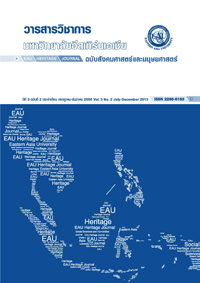กลยุทธ์การพัฒนาคุณลักษณะผู้นำแบบไทยของผู้บริหารสถานศึกษาขั้นพื้นฐาน
Keywords:
คุณลักษณะผู้นำแบบไทย, ผู้บริหารสถานศึกษา, สถานศึกษาขั้นพื้นฐาน, characteristics of Thai style leaders, leadership Thai style, administers in Basic Education InstitutionAbstract
การวิจัยนี้ เป็นการวิจัยเชิงปริมาณควบคู่กับวิจัยเชิงคุณภาพ มีวัตถุประสงค์เพื่อศึกษาผู้บริหารสถานศึกษา ขั้นพื้นฐาน ดังนี้ (1) ศึกษาองค์ประกอบของคุณลักษณะผู้นำแบบไทยของผู้บริหาร (2) ศึกษาสภาพปัจจุบันของ ผู้บริหารตามคุณลักษณะผู้นำแบบไทย (3) ศึกษาคุณลักษณะผู้นำแบบไทยที่พึงประสงค์ของผู้บริหารตามความคาดหวัง ของตัวผู้บริหารสถานศึกษาและผู้เกี่ยวข้อง (4) พัฒนากลยุทธ์การพัฒนาคุณลักษณะผู้นำแบบไทยของผู้บริหาร ประชากรและกลุ่มตัวอย่าง คือ ผู้อำนวยการโรงเรียน หัวหน้ากลุ่มสาระ ประธานคณะกรรมการสถานศึกษา และ ผู้ปกครอง เครื่องมือที่ใช้ในการวิจัย คือ แบบสอบถามแบบมาตราส่วนประมาณค่า การวิเคราะห์ข้อมูลใช้วิธีการ หาค่าร้อยละ ค่าเฉลี่ย ส่วนเบี่ยงเบนมาตรฐาน ผลการวิจัยพบว่า (1) องค์ประกอบคุณลักษณะผู้นำแบบไทยมี 5 ด้าน คือ ด้านความรู้ ด้านทักษะ ด้านทัศนคติ ด้านบุคลิกภาพ ด้านคุณธรรมและจริยธรรม (2) สภาพปัจจุบันของ คุณลักษณะผู้นำแบบไทยของผู้บริหารสถานศึกษาขั้นพื้นฐาน โดยภาพรวมมีการปฏิบัติอยู่ในระดับมากทั้ง 5 ด้าน แต่เมื่อพิจารณาเป็นรายด้าน พบว่า ด้านความรู้กับด้านทักษะอยู่ระดับปานกลาง (3) คุณลักษณะผู้นำแบบไทย ของผู้บริหารสถานศึกษาตามความคาดหวัง พบว่าโดยภาพรวมทุกด้านอยู่ในระดับมาก ด้านที่มีค่าเฉลี่ยมากที่สุด คือ ด้านคุณธรรมและจริยธรรม (4) กลยุทธ์การพัฒนาคุณลักษณะผู้นำแบบไทย มี 2 กลยุทธ์หลัก 6 กลยุทธ์รอง และ 12 วิธีดำเนินการ โดยมีกลยุทธ์หลัก คือ (1) กลยุทธ์เสริมสร้างทักษะผู้นำแบบไทยในศตวรรษที่ 21 และ (2) กลยุทธ์พัฒนาเครือข่ายความร่วมมือ
Strategies for the Development of Thai-Style Leaders’ Characteristics of Administrators in Basic Education Institution
This mix method research aimed to (1) analyze the characteristics of Thai leadership style of administrators in basic educational institutions, (2) study the current and existing situations of administrators based on the Thai leadership characteristics, (3) systematically analyze the desired traits and characteristics of administrators and pertinent leaders in basic educational institutions, (4) develop strategies to enhance qualities and traits as well as characteristics of the leaders, teachers, school administrators and all those involved in running and operating basic educational institutions. The population of the study included school administrators, subject leaders, chairman of education committee and parents. The tools used were questionnaires and interview questions, with statistical tools being percentile, average and standard deviation. The study has found the following results: (1) There are five main areas of Thai-style leadership characteristics: knowledge area, skills, attitude and mindset, personality, and ethical and morality areas. (2) Currently, the Thai-style characteristics of administrators in basic educational institutions touched or possessed each of the above characteristics; however, the areas of knowledge and skills sets were only at an average level. (3) The desired Thai-style leaders’ characteristics of administrators in basic educational institutions are at a high level, while the areas with maximum desired levels are ethical and moral area. (4) The strategic roadmap to enhance and develop the Thai-style leaders’ characteristics consists of 2 main strategies, with 6 sub strategies, and 12 additional methods. The two main strategies are: a strategy to build the skills of Thai-style leaders in the 21st century; and a strategy to build and develop collaborative networks.





